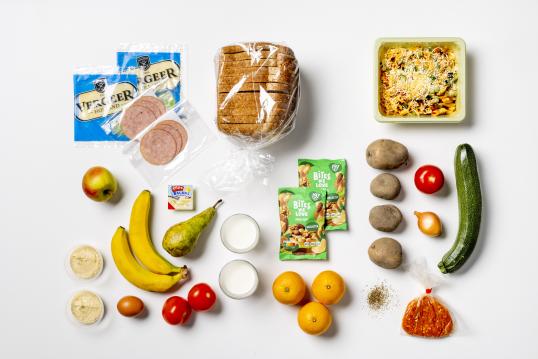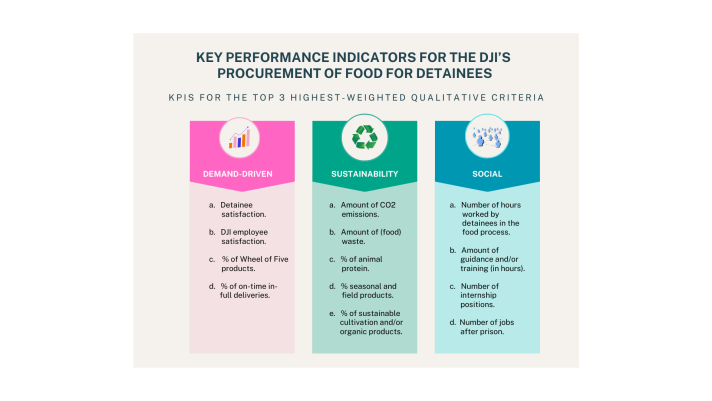Procurement category: Food & catering
Environmental impacts targeted: Reduction of food waste
Relevant EU legislation/policy/guidance: EU GPP Criteria on Food, Catering Services and Vending Machines
Background
The Dutch Custodial Institution Agency (DJI) is responsible for the enforcement of sentences and custodial measures issued by Dutch courts as well as the day-to-day care and rehabilitation of detainees. One of the tasks of the DJI is to provide three meals a day for all 10,000 detainees across 25 prisons under their jurisdiction. In 2020, the DJI began a procurement process to contract for the food in all of their prisons.
As the Netherlands has witnessed substantial policy developments shaping a transition to a sustainable, carbon-neutral and circular society, the DJI recognised the impact of these policies on its food purchasing.
Procurement objectives
In previous years, the DJI received complaints about the lack of quality, flexibility and choice in prison foods which has generated a large quantity of food waste. This tender sought to follow the Dutch Nutrition Centre’s science-based Disk of Five Dietary Guidelines, consider religious, health and lifestyle restrictions, contribute to the reintegration of detainees, address the issue of climate change and stimulate a protein transition from meat to plant-based without compromising the quality or taste of the meals.
The contracting authority conducted pre-tender research to understand the average costs of food and inform the asking price. In order to stimulate supplier-led proposals, a negotiated procurement procedure was chosen.
Criteria used
The scope of the contract was defined as the provision of daily nutrition for detainees in DJI's penitentiary and immigration detention facilities and concerned the supply of bread, savoury sandwich fillings, fruit, dairy products and (ingredients for) hot (diet) meals.
The schedule of requirements noted several directives and guidelines the suppliers were expected to adhere to, including the European HACCP directive, Allergens Act and Disk of Five guidelines. The Contractor was instructed to minimise and monitor food waste, both at location and in its supply chain, actively contribute to sustainable, CO2-neutral and circular initiatives established by the government and comply with the International Social Terms and Conditions (ISV), including an analysis and plan to address production chain risks.
In this tender, the contracting authority shifted from more traditional, detailed and pre/described criteria towards an increasingly demand-driven approach. Rather than a centralised contract defined by the headquarters, the decision-making process was allocated to the DJI’s 26 local institutions within a framework contract and, while suppliers worked within set boundaries, there was a great amount of flexibility to operate in order to adjust the service to fit the location’s specific conditions.
The DJI decided to not tender with a main focus on price. Based on pre-tender research, a reasonable price was set up-front that would allow suppliers to provide daily food. The tender evaluation was based 20% on price (within a set price range) and 80% on quality.
On quality, the three requirements given the highest weights for consideration addressed a demand-driven process (weighted at 25%), sustainability (weighted at 25%) and purchasing with (social) impact (weighted at 15%).
Demand-driven
The tenderer was instructed to describe how their services would provide every detainee with daily nutrition suitable to the needs of both the individual and the location. The proposals were asked to cover several topics, including:
- How is the demand for food mapped, including tasks and responsibilities of Tenderer employees, DJI employees and the detainees?
- What choices can a Detainee make with regard to daily nutrition?
- How are meals, products and ingredients composed and delivered to a Location and ultimately handed over to the detainees?
- How are the differences between individuals and the differences between the facilities in a department taken into account?
- How is it ensured that detainees choose healthier meals and products?
- How is satisfaction with the service measured?
- How are process improvements (within the Location and within the Tenderer's supply chain) realized during the term of the contract?
Sustainability
The tenderer was instructed to describe how their services would contribute to achieving the objectives of the Paris Climate Agreement and minimise the impact on the environment. The proposals were asked to cover the following topics:
- In what way is circularity taken into account?
- How is food waste prevented? Both at the prison and in the supply chain of Tenderer.
- How are CO2 emissions minimised from source to plate?
- In what way are animal proteins in the products and meals offered reduced, without decreasing the satisfaction of recipients? In what way will the proportion of plant-based protein be increased?
Social
The tenderer was instructed to describe how they can contribute to the social mission of DJI by guiding Offenders to a successful return to society. The proposals were asked cover the following topics:
- To what extent do you allow detainees to participate in the process for nutrition? Consider for example, distribution of food, preparation of meals, composition of assortment, etc.
- How are detainees assisted in learning how to cook and teach food skills?
- What opportunities for guiding detainees to employment does Tenderer?
When assessing the criteria, scores were assigned on a on a scale of 2 (poor) to 10 (excellent).
Contract performance clauses
The tender indicated the following Key Performance Indicators (KPIs) for demand-drive, sustainable and social considerations:
| Demand-driven | Sustainability | Social |
|
|
|
Each supplier determined their own KPIs with the same goal and tenders were expected to set growth paths for each KPI. During the contract, all KPIs are expected to grow, in line with the quality of service. The KPIs are regularly monitored and reported.
To monitor the perception of food in prison, DJI collaborates with the universities of Leiden and Brussels to conduct a biannual survey of food quality at every prison. To prevent food waste, the food quality should be ranked at least 6/10. The results are discussed with DJI management, the supplier and detainees in order to keep the food service humane and discover new ways to improve the quality of prison life.
Results
The negotiated procedure took place in two stages. During the first stage, the six bidders who expressed interest were asked to respond to a series of questions regarding capacity and scope. From their responses, four suppliers were invited to visit the detention centres which would be served and invited to submit proposals. After considering the most economically advantageous tender, the contract was awarded to three suppliers. The contract period is 2022-2030 and the total value is €250 million. The scope is divided into five regions with each supplier responsible for a maximum of two.
The tendering process included a market consultation stage, first with questionnaires, then 1-1 interview and, finally, several online conversations with multiple market participations. These group discussions were beneficial for suppliers who had the ability to exchange knowledge, learn from each other and establish working relationships. The market dialogues have resulted in each chosen supplier partnering with a smaller organisation with greater topical or technical expertise on how to work with detainees and assist with the reintegration of detainees. This increases the quality of services.
Environmental impacts
According to the EU GPP Criteria on Food, Catering Services and Vending Machines, the key environmental impacts of food procurement are associated with the food’s production, specific food product categories, energy and water use in catering services and the proliferation of food waste.
This contract addresses several important components of food procurement via the promotion of plant-based proteins, the composition and delivery of products, process improvements and efforts to reduce food waste through increased quality. By strengthening quality assurance and regularly surveying, analysing and adapting meals, the contracting authority is able to minimise the amount of disposed food.
Lessons learned
- Start with a clear vision in mind.
- Know what your organisational stands for and translate it to an outcomes-based contract.
- Involvement of all stakeholders within the organization is necessary to make change and find a suitable solution. Especially the detainee (the end user).
- Find sponsors within your organization at management level who share your vision and have confidence in you (and the chosen approach).
- Allow suppliers the flexibility to work within a set of boundaries allows them to adjust services to fit a location’s specific conditions.
- Contracting authorities should demonstrate how suppliers can incorporate sustainability ambitions into their work.
- Consider how you can keep track of implementation through continuous monitoring (food research in collaboration with the university, audits by an audit agency, visits to the Netherlands Nutrition Centre, quarterly on-site discussions and central contract management).
- Despite a complex and integrated approach, keep implementation manageable and assign responsibilities at the right level (detainee, prison location and central contract management).
More information
Tender documents available online.
For more information about the Dutch prison system, visit the website of the Judicial Institutions Service.
Relevant EU legislation/policy/guidance: EU GPP Criteria on Food, Catering Services and Vending Machines, and the Technical report.


